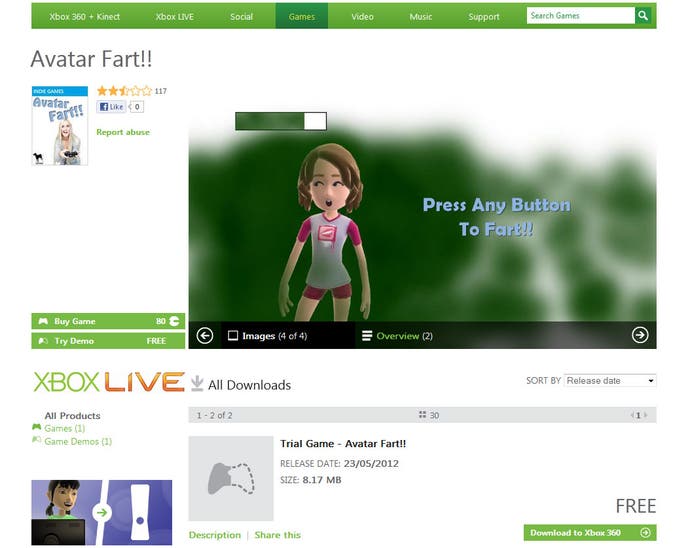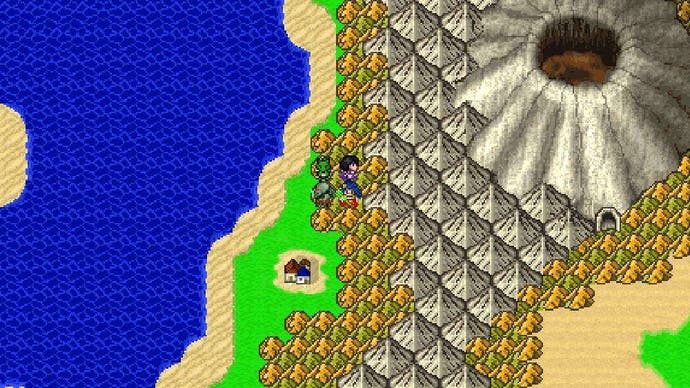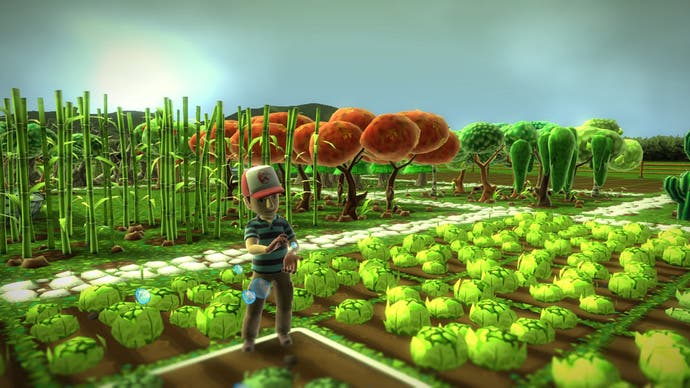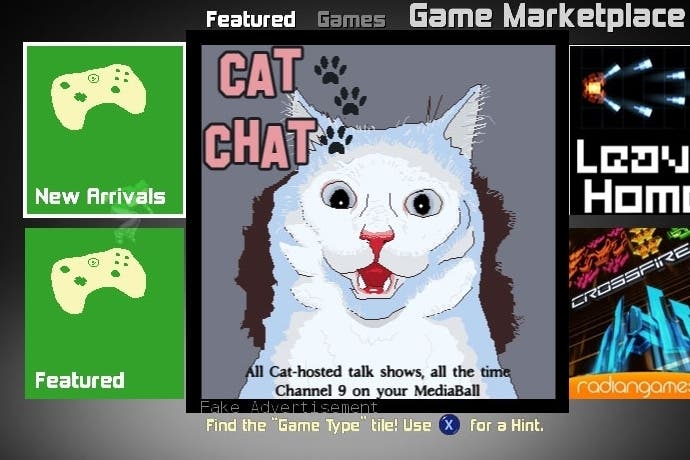Microsoft's war of independence
With XNA development cancelled, where next for Xbox Live Indie Games and the developers who call it home?
It's not looking good for the Xbox Live Indie Games channel. First Microsoft ceases development of XNA, the codebase that drives the self-publishing service that allows eager devs to sell their wares on the Xbox 360. Then Nat Brown, creator of the original Xbox, criticises Microsoft for what he sees as the "primary problem" with the Xbox 360, namely the lack of "a functional and growing platform ecosystem for small developers".
The Indie Games slot on the Marketplace has diminished with every dashboard update, and while Microsoft has made some steps towards raising its visibility since, there's ample evidence that its presence on the Xbox Live Marketplace is merely tolerated rather than actively supported. Though Microsoft may yet surprise us by launching the console version of Apple's App Store, the assumption from most in the XNA development community is that the Indie Games Channel will quietly vanish when the next Xbox rolls around.
Will anyone miss it? After some early promise the service never quite shook off the perception that it was awash with tatty clones and ugly Avatar games, and it certainly never produced the sort of breakout hit needed to give it commercial credibility in the eyes of consumers.
Yet if you dig deep enough, there were - and still are - a small number of developers for whom XBLIG is not just their platform of choice, but the foundation of their business. What does the future hold for them? Should Microsoft abandon its indie experiment? To find out, Eurogamer spoke to three XNA developers who have all stuck with the service through thick and thin.
I catch up with Nathan Fouts just as Serious Sam Double D XXL, his first Xbox Live Arcade game, goes on sale. Under the Mommy's Best Games moniker, Fouts was one of the first developers to gain attention on the Indie Games channel, breaking away from Insomniac Games to work solo on well received shooters like Weapon of Choice, Explosionade and Shoot 1UP. For him, the appeal was the chance to work independently but still publish on a mainstream console.
"When Microsoft announced XNA and Xbox Live Indie Games, I was thrilled at the thought that anyone with the desire could make their own console games and sell and distribute them to others."
Robert Boyd, Zeboyd Games

"I love the big screen," he explains. "I love the controller. Allow me to wax foolish for a moment. Console gaming feels like a real commitment. You can't do your taxes on the machine. You're not also checking email and then popping back to play a level. You're not waiting for the bus. You've sat down, and by damn, you're going to play a video game."
But even he admits that these days he's as likely to use his Xbox for watching Netflix as for gaming. It's ironic, since Fouts was one of the most visible critics of the dashboard redesign that sidelined XBLIG behind an inexplicable icon of a woman in a green hoodie, with the meaningless tag "Game Type". That inspired Fouts to create Game Type, a satirical shooter parodying the move that attracted considerable attention - both among gamers and, it seems, within Microsoft.
"Some Microsoft employees contacted me - we'll keep them anonymous - to say the game made a sizeable stink around there," he confesses. "The Dashboard was updated shortly thereafter. Obviously we don't know to what degree Game Type helped, if at all. Either way, I'm thrilled such a big company was able to change course for the better so quickly."
The journey of fellow developer Robert Boyd of two-man team Zeboyd Games is almost an exact inverse of the one Fouts has taken. Whereas Mommy's Best Games has graduated from the Indie Games channel to Xbox Live Arcade, Zeboyd inherited the Penny Arcade On The Rain Slick Precipice of Darkness series, taking it from XBLA to XBLIG.
"When Microsoft announced XNA and Xbox Live Indie Games, I was thrilled at the thought that anyone with the desire could make their own console games and sell and distribute them to others," says Boyd of those heady early days. Working with co-developer Bill Stiernberg, he created the 16-bit RPG tribute Breath of Death 7 and followed it up with Cthulhu Saves The World.
Despite positive reviews, the commercial realities proved to be less than impressive however. Breath of Death sold a healthy 60,000 copies, but Cthulhu shifted only 45,000 despite taking over twice as long to create and attracting much more coverage. "We were hoping for much better sales and were disappointed to not see them," admits Boyd. "So, no, XBLIG alone hasn't proven a viable business model for our games, but as a supplement to our Steam sales, which are exponentially better than our XBLIG sales, it's nice."
Having a media footprint and developing games for PC simultaneously clearly makes any income from XBLIG a welcome bonus but there are developers, such as Spanish team Milkstone Studios, that have managed to create a viable business solely from the Indie Games channel. Set up by Alejandro González Fiel and Miguel Herrero Obeso, Milkstone has turned out 23 polished and playable titles across multiple genres in just a few years. From racing games to realtime strategy, from the rural management sim Avatar Farm to Slender-style horror White Noise, the micro studio has a work rate that would make most AAA studios blush.

"Making games was easy, almost like a hobby, and we earned money from it, so why not?" says Fiel of the decision to devote their resources exclusively to XBLIG after the success of their debut title, Little Racers. "We've been working on this full time for two years with an acceptable wage. We managed to hire an artist six months ago, and we're planning on hiring another one soon. Last year was a little bad sales-wise, mainly because the first Metro dashboard was a mess. I tend to think that even XBLA sales were affected by this, but the last dashboard update fixed most usability issues."
Even with decent sales, there was little surprise from Milkstone when Microsoft dropped the axe on XNA. "It's something that more or less everybody knew a year ago, but without official confirmation," admits Fiel. "Lack of communication with Microsoft, and [XNA developer] Shawn Hargreaves shifting to the Windows Phone team were enough to see that XNA was not a priority at all, so this was not unexpected."
It's an attitude echoed by other developers, who have sense the writing on the wall but were still enamoured with XNA's open nature. "I realise things take time and healthy communities take effort," muses Nathan Fouts. "I saw some real involvement by the early XNA devs and core people, and once connected to XBLIG, letting you make your own games on the Xbox, I saw the potential. It's worth fighting for. It's not every day a huge company opens up their technology to everyone, gives out the tools for free, and even lets you get paid for it. It's got problems, but I wanted to work with others to try to right things."
The prognosis from those in the trenches is generally resigned, however. "Microsoft is tied to an old business model, selling games in brick and mortar stores from massive publishers," Fouts reckons. "The App Store was built from the ground up, a slightly more reasonable level playing field, for new technology. As long as the core of the Xbox is split between digital and physical, their marketplace will stay conflicted, unsure how much they can allow self-published titles to flourish."
For others, its the very openness of the channel that has contributed to its downfall, with the ratio of wheat to chaff discouraging casual customers from digging deeper. "I believe the Indie Games channel's reputation has steadily gotten worse over time," admits Robert Boyd. "Anyone can release on XBLIG which is both a blessing and a curse. It's great that anyone who wants to make a game can do so, share it with others, and maybe make a little money as well, but on the other hand, that means there's an awful lot of horrible games on the service. As we've seen, most people don't want to take the time and effort to dig through in search of the gems."
"The App Store was built from the ground up, a slightly more reasonable level playing field, for new technology. As long as the core of the Xbox is split between digital and physical, their marketplace will stay conflicted, unsure how much they can allow self-published titles to flourish."
Nathan Fouts, Mommy's Best Games

So where next for the Xbox Indie Game developers? Interestingly, none of them even mention the prospect of moving over to iOS but, perhaps inevitably, none of our interviewees see the Indie Games channel sustaining them for much longer either, at least in its current form. Milkstone, at least, believes that the next generation won't turn its back on them. "We'd be really surprised if MS doesn't add some kind of open marketplace on the next Xbox," says Fiel. "They did with Windows 8 and, although there's lots of room for improvement in its actual implementation and policies, it was a good idea."
That use of the past tense doesn't bode well, but Milkstone is in no rush to abandon the platform, despite its uncertain future. "We'll keep releasing games on XBLIG on the current Xbox unless they remove it from the marketplace," Fiel insists, arguing that there's at least another three years of residual life for indies like Milkstone on the 360. "We're also looking at PC development, but it's unlikely we'll sell enough for a living there unless you get to Steam, and getting through Greenlight is stupidly hard."
For Zeboyd, however, Steam is the logical next step and once the next Penny Arcade game launches, hopefully around April, Robert Boyd doesn't seem to have much attachment left to the Indie Games channel. "We're very pleased with how our games have been doing on the PC so we no longer rely on XBLIG sales like we did when we were starting out," he explains. "We're going to be looking very closely at the new systems from Microsoft, Sony and Nintendo, but it's too soon to set any definite plans on which platforms we'll be supporting in the future."
That's also the plan for Mommy's Best Games, which is currently "looking for partners to release on next gen consoles from Microsoft and Sony" as well as developing Pig Eat Ball, a four-player game for the Ouya console. Yet for all the disappointments, there remains a strange optimism, a sense that Microsoft could still reverse the downward trend and stop the exodus of commited developers if only it came up with a coherent and compelling indie model for its next console. Nobody, it seems, wants to let go of the dream without a fight.
"It'd be extremely disappointing to see them take such an inspired, and interesting step forward with XBLIG only to back up, and lock the console down," says Fouts. "Here's to them having the courage to keep their next console open."









